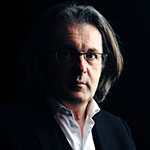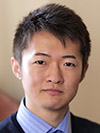Toru Takemitsu Composition Award
4 Finalists selected for Toru Takemitsu Composition Award 2021
[Judge: Pascal Dusapin]
9 Feb, 2021
Pascal Dusapin, judge of the Toru Takemitsu Composition Award 2021, has chosen the following 4 orchestral works out of 91 entries from 32 countries (Countries & Regions) eligibly accepted by 30 September 2020. Screening was done with the anonymous scores having only their titles.
These 4 nominated works will be performed on 30 May 2021 at the Tokyo Opera City Concert Hall : Takemitsu Memorial for Mr. Dusapin’s final judgement. Here is the list of finalists in order of their entry.
Applications for 2021(PDF/132KB)
- Year 2021 Pascal Dusapin (France)
-

© Philippe Gontier
/ Editions Salabert
Finalists (in order of entry)
Giorgio Francesco Dalla Villa (Italy)
BREAKING A MIRROR for orchestra
Born in Milan, Italy in 1986. He completed his academic studies in composition in 2017 at Milan’s "Giuseppe Verdi" Conservatory studying with Paolo Rimoldi. Since 2018 he has been attending Fabio Vacchi’s specializing courses at Fiesole Music School.
After being selected by the jury chaired by Ennio Morricone as finalist in "Michele Novaro Composition Competition 2018", he won the "Mameli Prize" and, in 2020, the special prize of "Péter Eötvös Contemporary Music Foundation" awarded by the Central European String Quartet. His musical achievements include the recording of two pieces with Romano Pucci, flutist from "Teatro Alla Scala Orchestra", and the recent selection as finalist at the "Alba Rosa Foundation composition competition" of Amsterdam.
http://www.giorgiofrancescodallavilla.com/

Jakob Gruchmann (Austria)
TEHOM für großes Orchester
Born in Salzburg, Austria in 1991. He studied composition (with Alexander Müllenbach, Gerd Kühr and Johannes Maria Staud) and music theory (with Ernst Ludwig Leitner, Christian Utz and Franz Zaunschirm) at the universities in Salzburg and Graz. He received the annual scholarship for music from the federal state of Salzburg in 2012. Since 2014 he has been teaching at the Gustav Mahler University (until 2019 conservatory) in Klagenfurt (Carinthia). In 2019 he was scholarship holder of the Université de composition "ARCO" in Marseille. In 2020 two of his pieces were performed in a portrait concert with the Mozarteum Orchestra Salzburg. His work currently comprises more than 70 compositions.
http://www.jakobgruchmann.com/

Kohsuke Negishi (Japan)
Moonlight Hidden in the Clouds for orchestra
Born in Saitama, Japan in 1998. He won the first prize as well as the audience award at the 37th JSCM Award for Composers for his chamber work and the 31st Asahi Composition Award for his choral suite both in 2020. He is currently a student at the Nihon University College of Art (Department of Music), and has studied composition under Hiroyuki Itoh.

Shion Sakai
Minchang Kang (Korea)
The echo of shadows, hallucination... for grand orchestra
Born in Ulsan, South Korea in 1988. He studied composition in Han-yang University, Seoul, South Korea where he finished his Bachelor degree with mention ‘Summa Cum Laude’. In 2014, he was selected as ‘young composer of the year’ at his university and took part in the concert for the first prize of the year. The same year, he participated in the 42nd Pan music festival (ISCM Korea).
Since 2019, he has been enrolling at the Strasbourg Conservatory for a master's degree in Prof. Daniel d’Adamo's class. He has also worked with ‘Ensemble imaginaire’ and ‘Quatuor Tana’, and one of his work was selected for the ‘Festival Musica’ in Strasbourg, France and was realized as a concert at France 3 broadcasting station.

Comments for the Final / as a single judge
for the Toru Takemitsu Composition Award 2021
I proceeded to work in the following fashion. Firstly, I studied several times each one of the 91 scores presented. During this first examination, I was struck by the similarities in technique and the development of orchestral materials that make it almost impossible to guess the nationality of composers in relation to a cultural style. This is a first important remark considering that this award pays tribute to Toru Takemitsu, rightly considered in the 20th century as not only one of the greatest composers but also a bridge between Japanese and western culture. And though he sought to go beyond this, calling instead for a universalisation of all expressions, his music was nonetheless easily identifiable amongst other composers.
I also noticed during these first readings a multitude of sound effects, often the same from one score to another, notated in a similar fashion (this undoubtedly indicates a globalisation of writing rules and styles as a result of the rapid exchange of information …), breaths, clicking of keys, slaps, percussive effects, multiphonics, harmonic sweeps etc.
I was surprised on many occasions by an almost systematic overload of orchestral writing, a great rhythmic complexity and micro-tonal intonations which make almost impossible, in my opinion, a faithful execution of the composers' intentions. Often, it has not been possible for me, through a simple reading, to hear or even imagine what the sound result would be as the combinations of instrumental effects are so different and numerous and almost enigmatic.
I therefore tried as much as possible to put myself in the shoes of the performing musician - in his or her place within the orchestra - and imagine to what collective feeling he could refer as an artist in order to interpret the quantity of written notations. This last point was the main criterion for my selection.
However, not all scores were written to the specifications I have briefly sketched out. I noticed on occasion a great virtuosic style of writing, a level of technical mastery above what I usually encounter and I regret not being able to distinguish more than four.
I therefore selected four scores whose ambitions I clearly understood: form, use and development of materials, orchestration, spatial organisation, verticality (harmonies), horizontality (lines), elegance and discourse.
BREAKING A MIRROR
I enjoyed in this piece the development of the form always arranged in a very intelligible fashion. An airy and transparent orchestration, with a great mastery of the instrumental groups, often bare timbres, clearly exposed, rich harmonies, without compression. The subject is unambiguous, well designed, very present.
TEHOM
I liked how this orchestra was written to the limits of its expressive possibilities, with raw inspiration and risks knowingly taken by the composer with great commitment. I noticed a great virtuosic style of writing, fully aware of the orchestra, an authentic lyrical force and a certain beautiful and fierce radicalism in the subject.
Moonlight Hidden in the Clouds
I enjoyed the fluidity of the forms, expressed in an intelligible and natural fashion. The figures and phrases unfold organically throughout the work, always well orchestrated, running through all the instrumental groups with great presence. A great feel and respect for the instrumental gesture.
The echo of shadows, hallucination ...
I liked the design of the melodic patterns. There is no orchestral overload but rather simple and beautiful gestures, soft and lively, always very controlled in their expression. There is a great elegance of the orchestral forms, no timbral opacity, beautiful harmonic spaces composed with refinement.
Pascal Dusapin
Final Concert
15:00, Sun. 30 May, 2021
Tokyo Opera City Concert Hall: Takemitsu Memorial
[COMPOSIUM 2021]
Toru Takemitsu Composition Award 2021: Final Concert
Pascal Dusapin, judge
Kanako Abe, conductor
Tokyo Philharmonic Orchestra
Contact us
Tokyo Opera City Cultural Foundation
3-20-2 Nishi-Shinjuku, Shinjuku-ku, Tokyo 163-1403 JAPAN
Tel. +81 3 5353 0770
Fax.+81 3 5353 0771